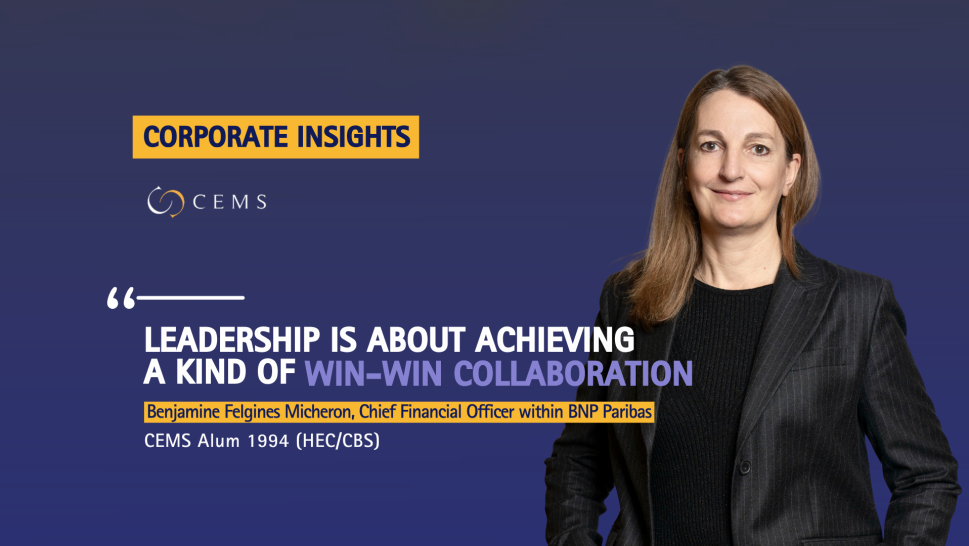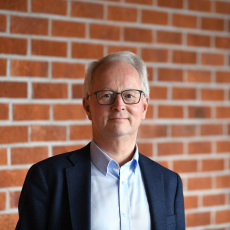WHAT’S YOUR STORY?
Benjamine Felgine-Micheron: CFO for BNP Paribas Factoring.
Tenure with BNP: 17 years+
Previous experience: Consulting with Accenture, SG Consulting and project management with AbnAmro Bank.
CEMSie? Yes! Graduate of HEC.
WHY BNP?
I’ve always been drawn to working in the banking sector and BNP is a leader in this space, which was a huge draw card. When you’re working for a leading organisation, it’s always going to be interesting. You’ll have exposure to a very broad range of activities and you’re going to be working in a high-performing environment, with talented people – experts and leaders. And that’s true of BNP. This is what I’d call a universal bank: we’re present in corporate and investment banking, in commercial banking in insurance and asset management, so it’s a very dynamic organisation.
I wasn’t a finance specialist when I started out in banking, but I was able to bring in my experience in product management and make that work. Over the years, I’ve moved around and upwards within the organisation, building my expertise in corporate finance. This is a world that is prone to so much change – both regulatory and in terms of innovation—that there’s a lot to learn. It’s super interesting and attractive to me.
YOU’VE BEEN WITH BNP FOR 18 YEARS. WHAT IS THAT HAS KEPT YOU HERE?
The last 18 years have flowed very fast indeed for me.
The first tranche of my tenure with the bank was spent in finance, dealing principally with financial reporting to top management or investors. In this area of banking, you’re hyper focused on the numbers and your exposure to the business and its clients can be quite limited.
Then, three years ago, I hit something of an inflection point. I was ready to move on, to try something new – whether that was a different bank or a wholly new sector. Talking to the company, I decided to make the switch internally, moving to the factoring part of the business. Here we work directly with the business which deals with clients to help finance and fund growth, and for me this has been a huge change and a significant transition, with its own learning curve and personal and professional challenges. It’s a completely different way of working.
The point is, the bank has given me the opportunity to grow, to evolve, and to develop completely different competencies and expertise, both in my years in finance and in terms of making a serious career pivot. Simply put, I don’t need to go elsewhere to make a big change and have new impact.
HOW HAS BNP SUPPORTED YOU IN MAKING THIS KIND OF CAREER AND LEADERSHIP PROGRESSION?
We have well-structured leadership programmes within the organisation that help you carve out a path to senior management. And there’s also plenty of room to define your own path and make your own choices about where you want to go, and the kinds of competencies you choose to develop, be that in operations, sales, finance, developing the business, client management and beyond.
Then as you progress and define your trajectory, there’s a lot of support both from HR but also from management. As leaders, we have that responsibility to interact with our team members, to find out how they want to learn and evolve and to support them in their progression journey. Over my own tenure, I’ve received plenty of this kind of support.
IS THAT HOW YOU SEE LEADERSHIP? SUPPORTING OTHERS?
My team is already quite experienced. They enjoy a great deal of autonomy within their positions. So, what’s interesting is that I’m there to bring support to them and to give them the advice that will help them achieve their own individual mission. Leadership, to me, isn’t about expressing authority necessarily. It’s more about helping each other evolve; it’s more about achieving a kind of win-win collaboration. In our day to day, my team and I will have a ton of discussions. Sometimes we agree, sometimes we don’t. But it’s never about control and command or top-down orders. It’s about helping others to progress in their leadership, and sharing experience and advice when it’s needed.
YOU MENTION DAY TO DAY. WHAT DOES YOUR TYPICAL DAY LOOK LIKE?
Banking is a heavily regulated industry, and every banking entity is prone to complex and often changing requirements – from the European Central Bank and other bodies. We have to work hard as teams to meet these requirements and to be transparent in our accounting processes and performance management.
This calls for a lot of collaborative teamwork and team meetings to ensure we are all aligned and working the right way. My own team is pretty dispersed. I have team members here in Paris and others in Brussels, for instance. So, every day we will have meetings and moments to connect. I think it’s important to meet physically too, so there’s a degree of travel and moving around to ensure we are in constant contact and working smoothly across the many different and diverse topics that fall under my responsibility.
BANKING IS HIGHLY REGULATED. BUT IS IT ALSO HIGHLY DISRUPTED?
Yes. And one of the biggest disruptors in our space is digital technology, which is bringing a whole slew of new players into the sector. One of the biggest challenges ahead of traditional banks is the need to cope with both newcomers and new technology: to be really on top of change, and to have the agility to pivot and to integrate new technologies and actors. And this is moving very fast.
One of the real advantages we have is that we are a large company, so we have the capacity to invest, to bring in the best talent and to integrate new players where there are synergies and opportunities.
I think for us a real priority is also responding in real time to the changes that technology is effecting in the way that we manage, care for and respond to our clients.
IS BANKING A SECTOR THAT WOULD APPEAL TO CEMSIES IN YOUR VIEW?
Absolutely! And as employers, we are constantly looking for talented people who are really structured in their thinking, and who have the adaptive capabilities to learn and progress. Of course, some interest in financial topics will help too!
I think CEMS is a fantastic base for banking and any other sector that requires you to live and work in a dynamic context. I joined the programme right at the beginning. Mine was one of the first cohorts in this exciting new programme that let you switch and study between countries. For me, it was the most incredible preparation to work in an open, cross-border European environment. It taught me to embrace difference and become more comfortable with change.
ANY ADVICE YOU WOULD SHARE WITH YOUNG PEOPLE EMBARKING ON THEIR CAREERS?
I think one of the best things you can do is go overseas and study abroad, like I did with CEMS. It’s just such a great way of expanding your thinking and opening your eyes – that and keeping you curious.
To me, curiosity is the key thing. If you are curious, you are more adept at managing changes in your environment, and you are much more open to the opportunities that emerge with change. Our world is evolving so fast, and we don’t know how we will organise or what our job markets will look like even in the near future. So my advice is to stay curious. Get out there and discover new contexts, new countries, new languages and technologies. Open your mind.




